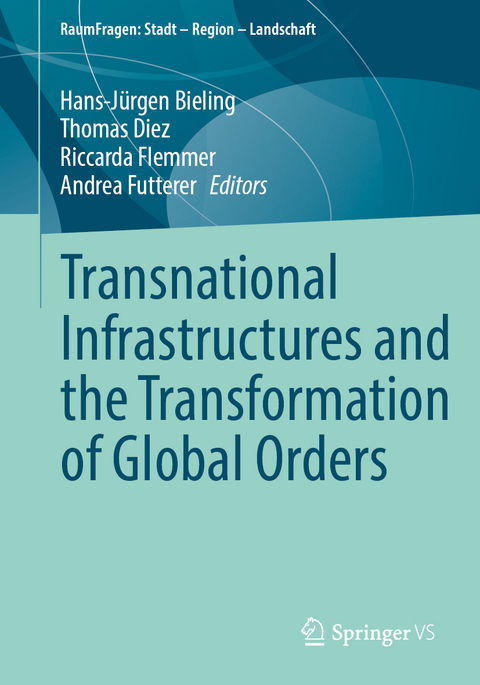
Transnational Infrastructures and the Transformation of Global Orders
Springer International Publishing (Verlag)
978-3-031-74845-5 (ISBN)
- Noch nicht erschienen - erscheint am 10.02.2025
- Versandkostenfrei innerhalb Deutschlands
- Auch auf Rechnung
- Verfügbarkeit in der Filiale vor Ort prüfen
- Artikel merken
Hans-Jürgen Bieling is Professor for Political Economy at the Institute of Political Science in Tübingen. Thomas Diez is Professor of Political Science and International Relations at the Institute of Political Science in Tübingen. Riccarda Flemmer is Junior Professor for “Political Struggles in the Global South” of the Global Encounters Platform at the Institute of Political Science in Tübingen. Andrea Futterer is a research associate at the Institute of Political Science in Tübingen.
Introduction: Transnational Infrastructures and Global Order(s).- Infrastructural Development and the Ordering of International Society.- Capitalism and Infrastructural Ordering: (Re)Crafting of Statehood and Territorial Power.- Infrastructure Conflicts in a New Geoeconomic Order - a Political Economy Perspective.- Dimensions of Infrastructures and the Digital Transformation of the Public Sphere.- Infrastructural Perspectives on Artificial Intelligence - On the Implications of AI Infrastructures for Global (In)Justice.- The Ambivalence of Infrastructures: The Complex Interplay of Development and Conservation in the Garhwal Himalayas.- The Political Economy of Transport Infrastructure and Energy Crisis: A Regional Study in 19th Century Germany.- Open Veins or Lifelines of Society? Infrastructures and the Order of Global Resource Extractivism in Latin America.- Blue-Green Infrastructure as an Innovative Approach to Sustainable Development.- Landscape Conflicts within Germany's Energy Transition.- Outer Space Infrastructures and Global Order: How the Control Over Satellite Constellations Reshapes State-Business Relations.- Spaces and Scales of a Street: Shifting Social Orders and Urban Transformation, as Seen From Marseille.- Infrastructures of Migration Regulation: Policing Migrant "Illegality" and Deportation in India.
| Erscheint lt. Verlag | 10.2.2025 |
|---|---|
| Reihe/Serie | RaumFragen: Stadt – Region – Landschaft |
| Zusatzinfo | Approx. 250 p. |
| Verlagsort | Cham |
| Sprache | englisch |
| Maße | 168 x 240 mm |
| Themenwelt | Naturwissenschaften ► Geowissenschaften ► Geografie / Kartografie |
| Sozialwissenschaften ► Soziologie ► Makrosoziologie | |
| Schlagworte | climate justice • communication infrastructure • Energy Infrastructure • environmental conflicts • geoeconomic competition • Geopolitical Conflict • global orders • Infrastructural power • infrastructural transformation • infrastructural violence • Infrastructure • Infrastructure System • international society • Social Inequality • sustainable development |
| ISBN-10 | 3-031-74845-X / 303174845X |
| ISBN-13 | 978-3-031-74845-5 / 9783031748455 |
| Zustand | Neuware |
| Haben Sie eine Frage zum Produkt? |
aus dem Bereich


